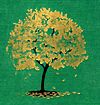1865-- How --1876
for the tired hero who came back to Raintree
County one day in the spring of 1865 like Lazarus from the dead.
When Johnny came marching home at the War's end and when the
reunions and discoveries of that extraordinary homecoming were
over, he found that in a sense the report of his death had not
been unduly exaggerated. Johnny Shawnessy, that innocent and
happy youth who had somehow contrived to keep in touch with the
elder Raintree County of before the War, was really dead (though
it took his successor a little while to become aware of the fact),
and the Raintree County to which he had fondly dreamed of returning
was also dead. Out of the shocks and changes of the War and the
equally great shocks and changes of the homecoming, there emerged
a new hero of Raintree County and a new County. The old (that
is to say, the young) Johnny was really gone, interred in the
triteness of Garwood Jones's poem. In his stead was John Shawnessy,
a sober young man of twenty-six, who had now a new life to live,
a new love to find, a new poem of himself and the Republic to
create.
Also the old Republic was gone.
Johnny Shawnessy had unwittingly put the torch to it along with
Atlanta and Columbia. The new Republic was something he hadn't
foreseen.
He hadn't foreseen the sooty monster
that stood alone after the smoke of battle had cleared, the Vanquisher
alike of vanquishers and vanquished. Before the War this monster
had been an awkward babe. But during the War he had put on muscle.
His name was Industrialism.
Johnny Shawnessy hadn't foreseen
that where there had been one factory before the War there would
be a hundred factories following. He hadn't foreseen that the
railroads would grow with magic speed until the huge vine enmeshed
the Republic in iron tendrils. He hadn't foreseen that hundreds
of thousands of Americans would leave the farms and go to the
great cities. He hadn't foreseen the great cities themselves
(for who could have foreseen these huge, glistening mushrooms
that appeared one morning on the surface of the Great Swamp!).
He hadn't foreseen how tides of aspiration, setting ever east
to west would bring millions of immigrants to America and how
the tidal glut of these innumerable faces would fill up whole
cities and run deep into the prairie leaving pools of alien speech
and alien ways around and far beyond the borders of Raintree
County.
He didn't foresee the Reconstruction
of the South, the doomed experiment of giving the black man a
vote by force of arms. He didn't foresee the scalawags and carpetbaggers
who exploited the prostrate South. He didn't foresee the bayonet
legislatures, the wrecked economy of the Cotton Kingdom. He didn't
foresee the inflamed race hatred that war left behind, the lynchings,
the Ku Klux Klan. He didn't foresee the impeachment of Andrew
Johnson (who was a cousin of Johnny Shawnessy's on his mother's
side), a shameful effort to wrest from an honest, if tactless,
Executive the power vested in him by the Constitution, a cynical
effort to destroy the balanced system of government. He didn't
foresee the sectional feeling kept alive for years after the
War by orators North and South. He didn't foresee the formation
of a Solid South, a political bloc, reactionary and resentful,
a separate culture in all but legal fact.
He didn't foresee that the greatest
Union General of the War, Ulysses S. Grant, would be elected
President, expressing for millions the wish to see a nation peaceful
and united, and he didn't foresee that, once elected, this politically
stupid man would become a helpless front for crooks in high place,
who bled the Republic of wealth and honor alike.
He didn't foresee the Tweed Ring
in New York, the Gas Ring in Philadelphia, the Whiskey Ring in
St. Louis. He didn't foresee the daring speculations, the corrupt
deals, the barefaced frauds. He didn't foresee the famous Corner
in Gold, the Credit Mobilier, the Panic of 1873. He didn't foresee
Jay Gould, Jay Cooke, Jim Fisk, Cornelius Vanderbilt, John D.
Rockefeller, J. P. Morganóthe new men, titans of industry,
amassers of corrupt fortunes, exploiters of millions, barons
of a new feudalism.
He didn't foresee the materialism
of the age, the spirit of getting wealth, of amassing property,
of conquering space, of mining and stripping and gutting and
draining, and whoring and ravaging and rending the beautiful
earth of America. He didn't foresee the grotesque buildings,
public and private, that festered on the land, the tenements
of stunted souls.
He didn't foresee any of these
things. Johnny Shawnessy didn't even foresee John Shawnessy.
. . . .

| The Novel | Essays | Other Writings | RL Jr. Writer's Award | Complete Contents | Book Orders |
| The Biography | links | Photos / Postcards | RC Source & Facsimiles | Suicide & Prevention | Movie & Score |